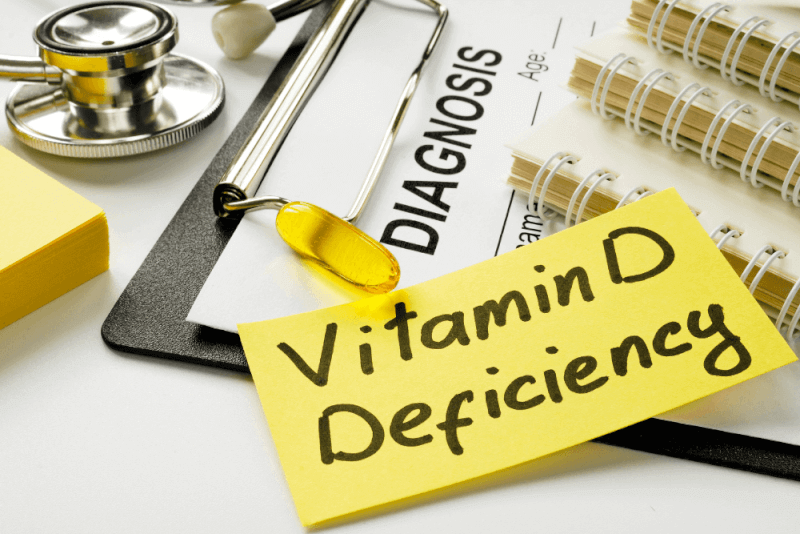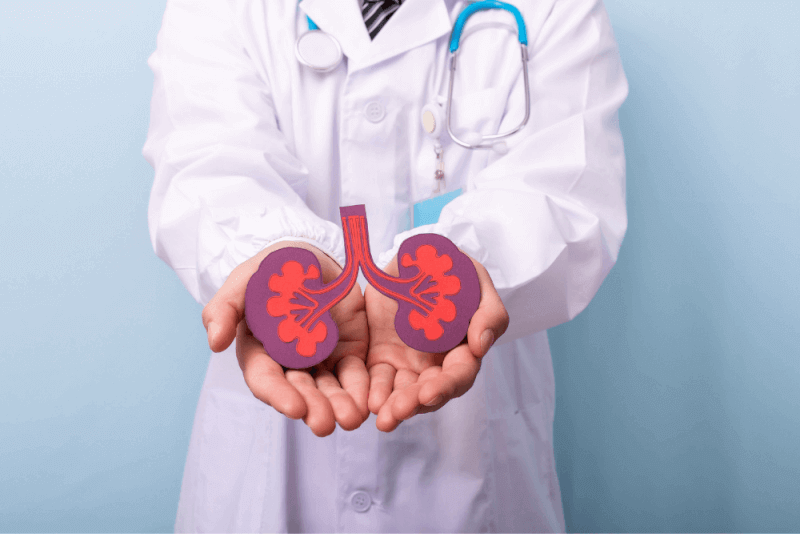What is Vitamin Deficiency?
Vitamin deficiency occurs when the body is unable to obtain enough vitamins. Vitamins are essential for the body to perform its normal functions. They are usually obtained through food. A lack of sufficient vitamins in the diet or the body's inability to metabolize them can lead to vitamin deficiency.
What Causes Vitamin Deficiency?
Generally, the foods we consume provide enough vitamins. However, under current conditions, it is not always possible to obtain sufficient amounts of vitamins. The factors that can lead to vitamin deficiency include the following:
- Seasonal transitions
- Unbalanced and irregular diet
- Pregnancy
- Improper storage and cooking of food
- Intense physical activity
- Digestive system disorders
- Stress
- Difficulty accessing natural products
- Use of tobacco products
- Low consumption of vegetables and fruits
- Air pollution
What Helps with Vitamin Deficiency?
There are two main methods to address vitamin deficiency. The first method is to increase the intake of the required type of vitamin through diet, while the second method is the use of vitamin supplements.
Nutrition
Individuals should organize their diet according to a balanced and adequate nutritional plan that includes various food groups to meet their vitamin needs. Additionally, for those with specific vitamin deficiencies, incorporating foods rich in that vitamin into their daily diet can help meet the requirement.
Vitamin Supplements
For those with vitamin deficiencies, vitamin supplements are generally used as a treatment method. These supplements can come in various forms, such as orally taken capsules, intramuscular injections, and water-soluble tablets. In addition, it is important to identify and treat any underlying conditions that may contribute to vitamin deficiency, such as certain diseases, advanced age, pregnancy, and special diets. It is essential to consult a doctor before using vitamin supplements.
What Does Vitamin Deficiency Lead To?
People with vitamin deficiency may experience certain complications. The most common complications include the following:
- Deficiency of many vitamins, especially Vitamin A, can lead to vision problems. Additionally, issues with normal and night vision, dry eyes, and other eye problems like night blindness can also occur.
- Cracks on the skin and tongue can be caused by certain vitamin deficiencies. These deficiencies can lead to issues like eczema.
- Prolonged bone pain often suggests a Vitamin D deficiency.
- Deficiency of certain B vitamins can lead to anemia.
- Vitamin B12 deficiency can affect mental performance, leading to issues such as difficulty concentrating and memory problems.
- Those experiencing gum bleeding or blood in the urine may suspect a Vitamin K deficiency.
- A deficiency in Vitamin E can lead to muscle weakness and reduced muscle mass, resulting in balance problems.
- A deficiency in Vitamin C can decrease collagen production in the body, leading to tissue breakdown and causing red or blue bruises on the skin.
Vitamin A
Vitamin A is essential for healthy vision and cell development. It also supports the immune and reproductive systems. Since the body cannot produce Vitamin A, it must be obtained from food.
There are two forms of Vitamin A. The first form is preformed Vitamin A, also known as retinol, found in some cereals and dairy products, as well as in animal products like beef, poultry, fish, liver, and eggs. The other form is provitamin A carotenoids, which are pigments found in plant sources that give fruits and vegetables their yellow, orange, or red colors. After consuming these foods, the body gradually converts carotenoids into Vitamin A. The most common carotenoid is beta-carotene.
Causes of Vitamin A Deficiency
Vitamin A deficiency occurs when the diet lacks sufficient Vitamin A. This is particularly common in impoverished countries. Other causes of Vitamin A deficiency include:
- Liver disorders, as the liver is responsible for storing most of the body's Vitamin A
- Chronic diarrhea
- Celiac disease
- Cystic fibrosis
- Certain pancreatic disorders
- Bile duct obstruction
- Zinc or iron deficiency
- Small intestine bypass
- Alcohol consumption
- Intestinal or pancreatic surgery
Symptoms of Vitamin A Deficiency
The symptoms of Vitamin A deficiency include:
- Night blindness is an early symptom of Vitamin A deficiency
- Dry eyes
- Inability to produce tears
- Formation of foamy spots called Bitot's spots on the whites of the eyes
- Corneal ulcers
- Drying of the cornea
- Blindness
Complications of Vitamin A Deficiency
If Vitamin A deficiency persists, it can lead to the following complications:
- Eye problems
- Dry, scaly, or itchy skin
- Infertility
- Delayed growth and development in children
- Respiratory infections
Vitamin B
Vitamin B consists of several subtypes, each of which plays important roles in energy production and cell formation in the body. While each type of Vitamin B has specific functions, they are also used collectively by the body to perform certain functions.
Types of Vitamin B
Vitamin B is divided into eight different types, which include the following:
Thiamine (B1)
Also known as Vitamin B1, thiamine helps convert glucose into energy. It also plays a role in nerve function.
Causes of Thiamine Deficiency
Thiamine deficiency is commonly seen in countries where white rice is a staple food. In Western countries, it is usually caused by excessive alcohol consumption or poor nutrition.
Symptoms of Thiamine Deficiency
The symptoms of thiamine deficiency include:
- Confusion
- Irritability
- Poor arm and leg coordination
- Lethargy
- Fatigue
- Muscle weakness
Complications of Thiamine Deficiency
Thiamine deficiency affects the nervous and digestive systems. The complications that may arise include the following:
- Thiamine deficiency can affect the regulation of hunger hormones in the brain. When deficient, people may feel full and eat less, leading to weight loss.
- Due to its role in energy metabolism, a lack of sufficient thiamine can make a person feel tired and weak.
- A deficiency in Vitamin B1 can cause difficulty in controlling anger.
- Thiamine deficiency can disrupt the nervous system, causing numbness in the arms and legs.
- Due to its effects on the nervous system, confusion may occur.
- Thiamine is needed for the proper functioning of the optic nerves. Deficiency may lead to vision problems.
- Nausea and vomiting
- Beriberi disease
- Wernicke-Korsakoff syndrome
Riboflavin (B2)
Riboflavin plays a role in energy production and also supports vision and skin health.
Causes of Riboflavin Deficiency
Riboflavin deficiency is rare and usually occurs alongside other B vitamin deficiencies. It is particularly seen in those who consume excessive alcohol and milk.
Symptoms of Riboflavin Deficiency
The symptoms of riboflavin deficiency include:
- Anemia
- Mouth sores
- Cracked lips
- Headache
- Sore throat
- Hair loss
- Skin problems
- Cataracts
Niacin (B3)
Niacin is used by the body to convert carbohydrates, fats, and alcohol into energy. It also helps maintain skin health and supports the nervous and digestive systems. Niacin is highly resistant to heat, so its loss during cooking is minimal.
Causes of Niacin Deficiency
Niacin deficiency, also known as pellagra, occurs in those who consume excessive alcohol or rely on corn as a staple food. It is also associated with digestive disorders that prevent the body from efficiently absorbing this vitamin.
Symptoms of Niacin Deficiency
The symptoms of niacin deficiency include:
- Pigmented rash on sun-exposed skin
- Rough skin texture
- Hallucinations
- Red, swollen tongue
- Memory loss
- Fatigue
- Headache
- Lethargy
- Depression
- Vomiting
- Constipation
- Diarrhea
Complications of Niacin Deficiency
Severe niacin deficiency can lead to the following complications, known as the 4 D's:
- Dermatitis
- Dementia
- Diarrhea
- Death
Pantothenic Acid (B5)
Pantothenic acid, also known as Vitamin B5, is necessary for metabolizing carbohydrates, proteins, fats, and alcohol, as well as producing red blood cells and steroid hormones.
Pantothenic Acid Deficiency (B5)
Vitamin B5 deficiency is extremely rare, as this vitamin is found in almost all foods.
Symptoms of Pantothenic Acid Deficiency
The symptoms of Vitamin B5 deficiency include:
- Headache
- Upper respiratory infections
- Irritability
- Fatigue
- Restlessness
- Numbness and burning sensation in hands and feet
- Disturbed sleep
- Stomach cramps
- Nausea
- Vomiting
Vitamin B6 (Pyridoxine)
Vitamin B6 is essential for protein and carbohydrate metabolism, red blood cell formation, and the production of certain brain chemicals. It also affects brain processes and development, immune function, and steroid hormone activity.
Causes of Vitamin B6 Deficiency
Vitamin B6 deficiency is commonly seen in individuals who consume excessive alcohol, women, the elderly, and those with thyroid disorders. Women who use birth control pills are also more likely to have a Vitamin B6 deficiency.
Symptoms of Vitamin B6 Deficiency
The symptoms of Vitamin B6 deficiency include:
- Increased risk of infections
- Confusion
- Cracks at the corners of the mouth
- Red, itchy skin rashes
- Swollen tongue
- Depression
- Numbness and tingling in hands and feet
- Anxiety
- Irritability
Biotin (B7)
Vitamin B7 is involved in energy metabolism, fat synthesis, amino acid metabolism, and glycogen synthesis. High levels of biotin can contribute to elevated cholesterol levels in the blood.
Causes of Biotin Deficiency (B7)
Biotin deficiency is rare as it is widely found in foods. The need for Vitamin B7 is very low, and deficiency is often seen in those who consume excessive amounts of raw egg whites, as a protein in egg whites can inhibit biotin absorption.
Symptoms of Biotin Deficiency (B7)
The symptoms of Vitamin B7 deficiency include:
- Hair loss
- Scaly skin rashes around the eyes, nose, and mouth
- Brittle nails
Folate or Folic Acid (B9)
Folate is the naturally occurring form of Vitamin B9, while folic acid is its synthetic form commonly found in supplements. Vitamin B9 is essential for the production of red blood cells that carry oxygen throughout the body. It also aids in fetal neural development, DNA synthesis, and cell growth. For these reasons, women of childbearing age need a diet rich in folate.
Causes of Vitamin B9 Deficiency
The causes of Vitamin B9 deficiency include the following:
- Digestive system diseases
- Excessive alcohol consumption
- Overcooking fruits and vegetables
- Hemolytic anemia
- Certain medications
- Pregnancy
- Genetic factors
Symptoms of Vitamin B9 Deficiency
The symptoms of folic acid deficiency include:
- Pale skin
- Headache
- Fatigue
- Anemia
- Changes in hair and skin color
- Difficulty concentrating
- Irritability
- Mouth ulcers
- Shortness of breath
- Heart palpitations
Cobalamin (B12)
Cobalamin, or Vitamin B12, is closely related to folate in its function, as both vitamins need each other to perform their roles effectively. Vitamin B12 helps produce and maintain nerve cells, supports mental abilities, forms red blood cells, and breaks down certain fatty acids and amino acids for energy.
Causes of Vitamin B12 Deficiency
Vitamin B12 is only obtained from animal sources, so those following a vegan diet are at higher risk of deficiency. Additionally, the absorption of B12 from the intestines decreases with age, making deficiency more common in older adults.
Symptoms of Vitamin B12 Deficiency
The symptoms of Vitamin B12 deficiency include:
- Balance problems
- Weakness
- Mouth and tongue pain
- Weight loss
- Memory impairment
- Loss of appetite
- Confusion
- Constipation
- Numbness in hands and feet
Complications of Vitamin B12 Deficiency
The complications of Vitamin B12 deficiency include the following conditions:
- Pernicious anemia
- Folate deficiency anemia
- Nerve damage
- Increased risk of heart disease
- Weakening of bones and increased risk of fractures
Vitamin C
Vitamin C plays several important roles in the body, including forming collagen in blood vessels, cartilage, muscle, and bones, supporting the body's healing process, protecting against the effects of free radicals, preventing cancer and other diseases, and aiding in the absorption and storage of iron.
Since the body cannot produce Vitamin C, it must be obtained from foods. Additionally, Vitamin C is not stored in the body, so it is essential to consume sufficient amounts of this vitamin daily.
Causes of Vitamin C Deficiency
The causes of Vitamin C deficiency include:
- Smoking
- Exposure to secondhand smoke
- Having certain digestive system diseases or cancers
- Following a limited diet that does not regularly include fruits and vegetables
Symptoms of Vitamin C Deficiency
A dramatic decrease in Vitamin C in the body can lead to scurvy. The symptoms of Vitamin C deficiency include:
- Gingivitis
- Slow wound healing
- Dry, brittle hair
- Joint pain and swelling
- Weakening of the immune system
- More severe infections
Complications of Vitamin C Deficiency
Vitamin C deficiency leads to a disease known as scurvy. The complications associated with this disease include:
- Anemia
- Restricted movement
- Weakness
- Bleeding
- Pain in the arms and legs
- Swelling in certain areas of the body
- Skin problems
- Gum disease
- Tooth loss
Vitamin D
Vitamin D, also known as calciferol, is divided into two types: D2 and D3. Vitamin D2 is mainly obtained from foods, while Vitamin D3 is typically absorbed from sunlight. The functions of Vitamin D in the body include:
- Aiding in the absorption and retention of calcium and phosphorus
- Playing a primary role in bone health
- Preventing rheumatic diseases
- Ensuring a healthy pregnancy
- Regulating insulin levels
- Protecting heart health
- Affecting the appearance of hair, nails, and skin health
Causes of Vitamin D Deficiency
The causes of Vitamin D deficiency include:
- Irregular sleep
- Insufficient exposure to sunlight
- Obesity
- Use of sunscreen while sunbathing
- Excessive consumption of processed foods
- Liver dysfunction
- Certain medications
- Spending too much time indoors
- Poor soil quality where food is grown
- Advancing age
- Insufficient intake of Vitamin D-rich foods
Symptoms of Vitamin D Deficiency
The symptoms of Vitamin D deficiency include:
- Brittle nails
- Difficulty concentrating
- Hair loss
- Weakness
- Dry skin
- Fatigue
- Joint pain
- Muscle and bone weakness
- Insomnia
- Feeling cold all the time
- Slow wound healing
- Depression
- Headache
- Pale skin
- Loss of appetite
- Weakening of the immune system
Complications of Vitamin D Deficiency
A lack of Vitamin D in the body can lead to the following complications:
- Chronic fatigue
- Osteomalacia
- Increased risk of Alzheimer's disease
- Muscle and bone pain
- Sleep disorders
- Increased susceptibility to illness
- Osteoporosis
- Bone fractures
- Obesity
- Impaired bone metabolism
- Rickets
Vitamin E
Vitamin E refers to a group of eight different compounds, including four tocopherols and four tocotrienols. As a fat-soluble vitamin, Vitamin E's functions in the body include:
- Protecting cell membranes from reactive oxygen species
- Shielding cells from free radical damage
Causes of Vitamin E Deficiency
Vitamin E deficiency is rare, but when it does occur, it can be caused by:
- Cystic fibrosis
- Bile duct obstruction
- Short bowel syndrome
- Fat metabolism disorders
- Abetalipoproteinemia
Symptoms of Vitamin E Deficiency
The symptoms of Vitamin E deficiency primarily affect the immune system, muscles, and vision. When caused by digestive system disorders, Vitamin E deficiency can lead to different symptoms, including:
- Difficulty walking
- Muscle weakness
- Poor balance
- Vision problems
- Tremors
- Numbness
Complications of Vitamin E Deficiency
Severe Vitamin E deficiency can lead to the following complications:
- Muscle weakness
- Walking difficulties
- Loss of muscle mass
- Reduced immune function
- Abnormal eye movements
- Vision problems
- Liver and kidney problems if deficiency persists long-term
Vitamin K
Vitamin K plays several important roles in the body, including:
- Supporting healthy bone formation
- Playing a crucial role in blood clotting
Causes of Vitamin K Deficiency
Vitamin K deficiency is especially common in newborns and can be caused by the following factors:
- Blockages in the bile ducts
- Lack of sufficient bacteria in the intestines to synthesize Vitamin K
- Limited transfer of Vitamin K from the mother's placenta
- Being exclusively breastfed
- Insufficient Vitamin K stores
In adults, Vitamin K deficiency can be caused by:
- Chronic diarrhea
- Bile duct obstruction
- Prolonged intravenous feeding
- Fat malabsorption
- Alcoholism
- Cystic fibrosis
- Poor nutrition
- Surgical removal of part of the small intestine
- Liver disease
- Use of anticoagulant medications
- Inflammatory bowel disease
- Pancreatic insufficiency
- Chronic kidney failure
- Dialysis
- Disseminated intravascular coagulation (DIC)
Symptoms of Vitamin K Deficiency
In newborns, the symptoms of Vitamin K deficiency include:
- Nosebleeds
- Bleeding around the umbilical cord area
- Intracranial hemorrhage
- Bleeding at the site of circumcision
- Bruising and bleeding in the skin
- Gastrointestinal bleeding
- Blood in the stool
In adults, the symptoms include:
- Pinpoint bruises on the skin
- Large areas of bruising
- Gum bleeding
- Bleeding under the nails
- Dark tarry stools due to intestinal bleeding
- Internal bleeding
Complications of Vitamin K Deficiency
Vitamin K deficiency is primarily associated with unexplained bleeding in the body. Other potential complications include:
- Von Willebrand disease
- Acute lymphoblastic leukemia
- Thrombotic thrombocytopenic purpura
- Acute myeloid leukemia
- Vitamin C deficiency
- Chronic lymphocytic leukemia
- Immune thrombocytopenia
- Chronic myeloid leukemia
- Glanzmann's thrombasthenia
- Disseminated intravascular coagulation
- Dysfibrinogenemia








